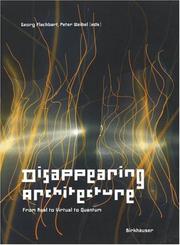| Listing 1 - 1 of 1 |
Sort by
|

ISBN: 9783764372750 3764372753 3038213772 9786612068225 1282068229 3764376740 Year: 2005 Publisher: Basel : Birkhäuser,
Abstract | Keywords | Export | Availability | Bookmark
 Loading...
Loading...Choose an application
- Reference Manager
- EndNote
- RefWorks (Direct export to RefWorks)
Im Zuge der rasanten Entwicklungen in der Informationstechnologie werden neue Umgebungen geschaffen, die sowohl die Architektur selbst als auch Rolle und Aufgaben der Architekten maßgeblich verändern werden. Architektur kann mit den bekannten Begriffen nicht mehr beschrieben werden kann, weil sie nicht mehr der Form entspricht, die wir kennen: als eine klar abgegrenzte und ein- und ausschließende Architektur mit einem Innen und einem Außen. Die zukünftige Herausforderung für Architekten wird somit zunehmend auch darin bestehen, mit hybriden Umgebungen kreativ umzugehen, das gestalterische Potential digitaler Räume innerhalb der physischen Umwelt zu erfassen und die Rolle für die Architektur innerhalb einer visuell dominierten Kultur neu zu definieren. Peter Weibel ist Vorstand des Zentrums für Kunst und Medientechnologie (ZKM) in Karlsruhe. Georg Flachbart arbeitet als Video- und Kommunikationsdesigner. Er ist Mitbegründer der mind(21)factory for Knowledge Engineering and Knowledge Design in Stuttgart/Frankfurt a.M./Berlin. The creation of new environments through the use of developments in Information Technology is significantly altering not only architecture itself but also the roles and tasks of the architects. Architecture can no longer be described in the terms we are familiar with since it no longer corresponds to the form of architecture as we know it: an inclusive and exclusive structure, clearly defined, with a single interior and a single exterior. For architects, the challenge of the future will increasingly lie in creatively coming to terms with hybrid environments, understanding and exploiting the design potential of digital spaces within the physical world, and redefining the role of architecture within a visually dominated culture. This volume presents a valuable and attractive contribution to the contemporary discussion on this subject.
Architecture --- Virtual reality in architecture. --- Réalité virtuelle en architecture --- Data processing. --- Informatique --- Architecture -- Data processing. --- Electronic books. -- local. --- Virtual reality in architecture --- Art, Architecture & Applied Arts --- Data processing --- 72.012/013 --- Virtuele architectuur --- Digitale architectuur --- 72:681.3 --- CAAD --- Computer aided architectural design --- Virtuele realiteit (architectuur) --- Architectuur en computerwetenschappen --- Réalité virtuelle en architecture
| Listing 1 - 1 of 1 |
Sort by
|

 Search
Search Feedback
Feedback About UniCat
About UniCat  Help
Help News
News